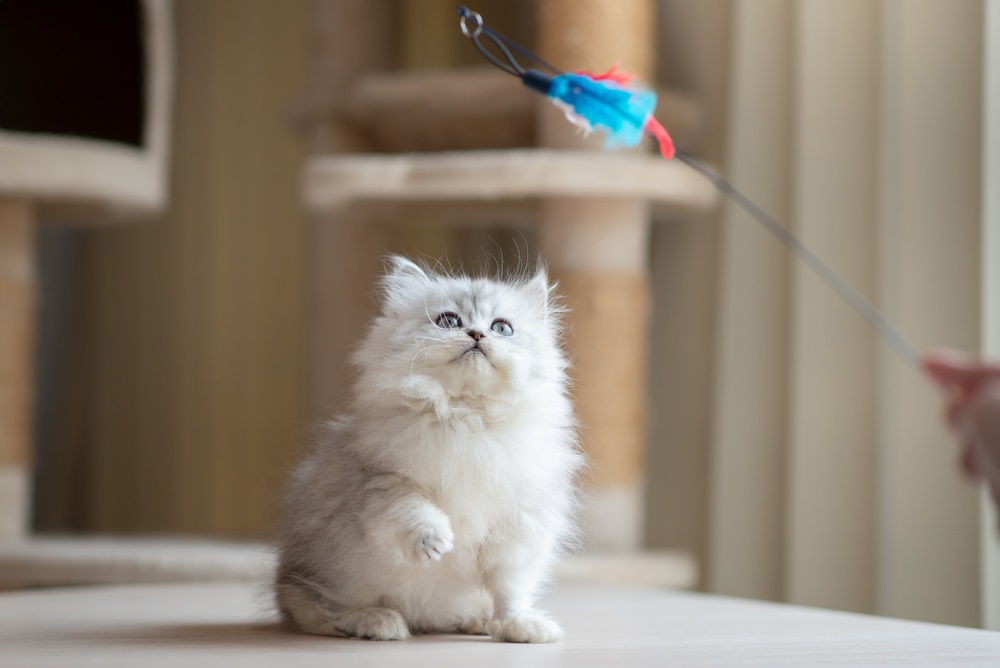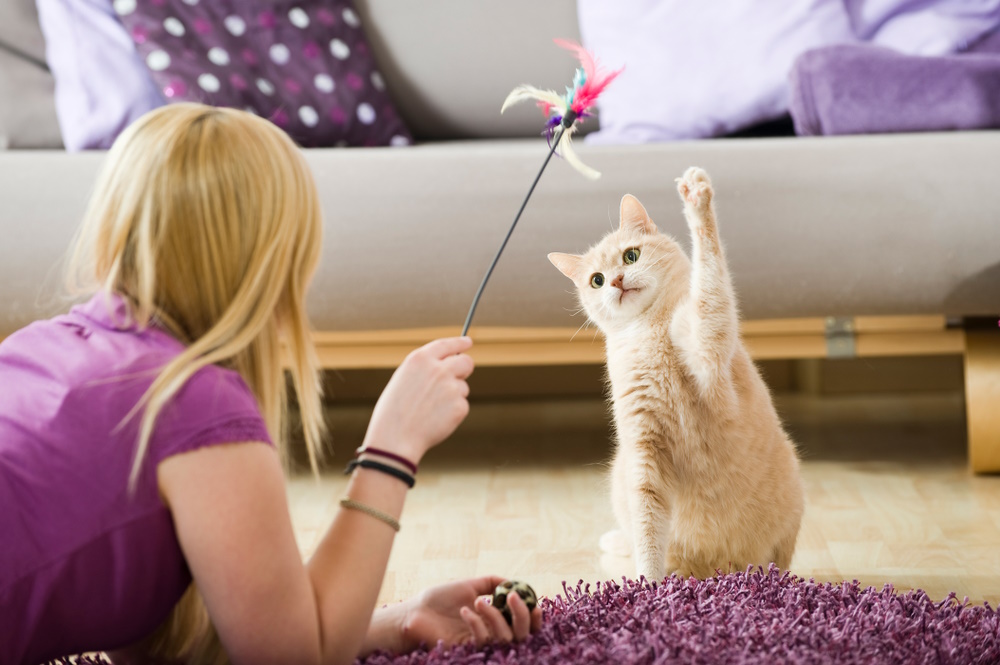Click to Skip Ahead
Review Summary
We give Rompicatz Adjustable String Wand Toy for Cats a rating of 4.6 out of 5 stars.
Cat parents know how much their feline pals enjoy wand toys, but they also know how quickly those toys can be broken apart by their cat’s claws and teeth. They also often have to choose between a wand toy with a string that’s too short or too long for their needs. But what if you could have a string wand toy where you could adjust the string according to your needs? You can!
Meet the Rompicatz Adjustable String Wand Toy! This toy from Rompicatz, which is manufactured by Pet Ki Enterprises, Inc., lets you adjust the string from a length of 1” to 36”, giving you a lot of wiggle room. The different lengths allow you to play with your cat in several different manners, so you can encourage hunting and stalking skills while ensuring your cat is getting daily exercise. Plus, there are switchable toys you can add to the end of the string. Overall, it’s a fairly neat wand toy!
Rompicatz doesn’t offer many products, as it deals almost exclusively in wand toys for felines. However, they do have a single rope toy for canines and seem to be in the process of adding some tunnels for cats that look fun. The Adjustable String Wand Toy is one of their wand toy lines, as are the Critter Collection and Japanese Mylar Toys. So, this company definitely seems to know what they’re doing when it comes to wand toys!
Rompicatz Adjustable String Wand Toy – A Quick Look

- Incredibly durable
- Can adjust the length of the string
- Can switch out the toys on the end of the string
- A bit pricey
- A few cats chewed through the string
- Fur on toys could be better
Specifications
| Manufacturer: | Pet Ki Enterprises Inc. |
| Brand Name: | Rompicatz |
| Model: | String Wand Toy |
| String Length: | 1” to 36” |
| Rod Length: | 18” |
| Weight: | 0.24 lbs |
| Materials: | Synthetic, Fur |
| Style: | Mouse, Bug, Crinkle Ball |
Adjustability
The biggest selling point of this string wand toy is its adjustability. With the Rompicatz string wand, you can adjust the length of the string as often as you want to suit your needs, which makes this unique among wand toys. The string can be adjusted to be anywhere from 1 inch to 36 inches, so you have quite a bit of variety in how long or short you can make it. Make the string short for play that is close-up, like enticing the cat to use a scratching post, or make it long for when you want to let your cat leap and bound.
Adjusting the length of the string is simple, as you merely uncap the end of the rod and pull the string toward you to shorten it or pull from the opposite end to lengthen it. The string gets stored in the rod (there’s a bead attached to the end of the string to keep it from going all the way through the toy), and there’s a video on the Rompicatz website that demonstrates how to store, lengthen, and shorten the string. This ability to adjust the string length was a huge hit with cat parents.
Durability
Felines can go hard when it comes to string wand toys; once they catch the end, they’ll pull and tug until they’ve ripped the rod from your hands. Because of this, these types of toys sometimes don’t last very long. Bits and pieces will break off, or the string will break, and playtime is over before you know it. However, that doesn’t seem to be the case with the Rompicatz Adjustable String Wand Toy.
The majority of cat owners were impressed with how durable this wand toy is. It seems the Rompicatz wand can withstand even the strongest pulling without the string tearing, and the toys attached to the end of the string hold up to the cat’s teeth. There also didn’t seem to be any accounts of pieces of the rod breaking off (which may be due to the rod’s safety features). This wand appears to last a good long time for most people.

Variety
Another aspect of this wand toy that people seemed to love was the variety it offers. Not only is there variety in the string length, but you also have three options of toys you can hang from the end of the string. Choose between a mouse, a bug, or a crinkle ball for kitty to enjoy, and switch them out as often as you want. Switching out the toys on the end is relatively easy since you only need to untie the bead from the end and pull the toy off (and the video on the Rompicatz website demonstrates how to do this, too). Plus, cat parents felt that the mouse and bug were extremely well-made. The bug, in particular, was a favorite of felines!
However, there is a downside here, which is the fact the toy only comes with one option. So, if you purchase the mouse wand toy, but also want to be able to switch the mouse out for the bug or crinkle ball, you’ll have to buy the other options separately.
Cost
The other potential negative about this wand toy by Rompicatz is the price. This toy is definitely much more expensive than most wand toys, especially when you factor in the cost of buying the toys for the end of the string separately. However, because this wand is so durable and can last for a long time, the cost might be worth it for some.
Recall History
We could find no recalls for Rompicatz or Pet Ki Enterprises, Inc.
Frequently Asked Questions (FAQ)
Are there safety features on this toy?
Yes! Any exposed metal is covered with foam, and there are no plastic or metal clips where the string attaches to the toy. Because of this, your cat will be safe from cutting their mouth or feet on this product.
Is the string on this chew-proof?
There were reports of a few cats chewing through the string on this toy, so it isn’t chew-proof. It did hold up for a majority of cats, though.
Is this toy good for encouraging hunting instincts?
Absolutely! Any wand toy is good for encouraging hunting instincts, but the mouse and bug on this one seem very real to kitties because of the way the toys are designed, which encourages them to hunt even more.

What the Users Say
We looked at what cat parents have to say about the Rompicatz Adjustable String Wand Toy, so you don’t have to go hunt down that information for yourself. Here are the things people enjoyed and disliked about this product.
Overall, the vast majority of cat parents loved this product, and there were very few complaints. The ability to adjust the length of the string for this toy was a huge selling point for cat owners, as it gave them more control over the toy, more ways to use it, and let their felines have a wider variety of play. They also liked the safety features of this wand, as some people had bad experiences with other wand toys when it came to safety in the past. The durability of this toy was a huge winner, too. Many users commented on how their cats pulled and pulled at the string (some kitties even tried to walk into another room while pulling!), but the string never broke. Another aspect people liked was how real the mouse and bug looked and felt.
There were a few things people didn’t like, though. As previously mentioned, a handful of cats managed to chew through the string, so if your kitty is big on chewing on cords and the such, they might be able to chew through this. A couple of people also felt the fur on the toys could have been better applied, as it unraveled a bit for them. Finally, some people were iffy about the price of this product. Most agreed the value was good, but this wand toy is definitely more expensive than most.
Conclusion
When it comes to durability, uniqueness, and design, the Rompicatz Adjustable String Wand Toy offers both cat parents and cats plenty! Overall, this product seems quite excellent and is a big hit with felines and their people. Whether your kitty enjoys hunting while something is dragged along the floor or is more prone to love leaping into the air to give chase, they can do it all with this wand toy. Thanks to the durability of this Rompicatz toy, it should last a long time for most (although kitties who love to chew might wear it down sooner). This means that despite the price, it could be well worth the investment for a majority of people.











